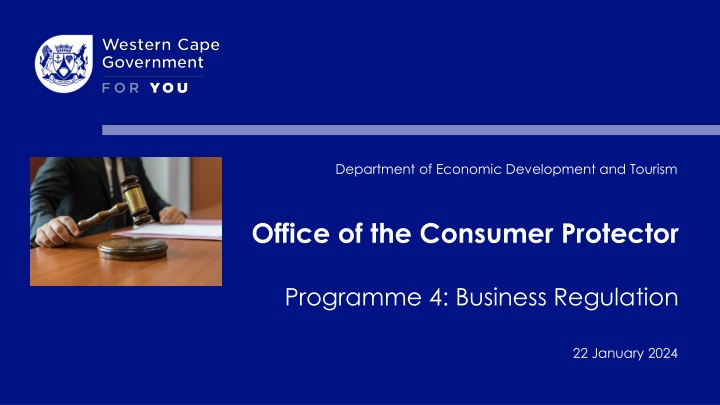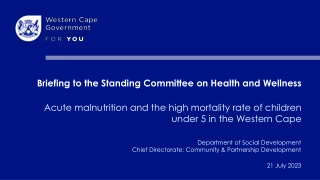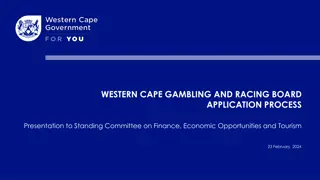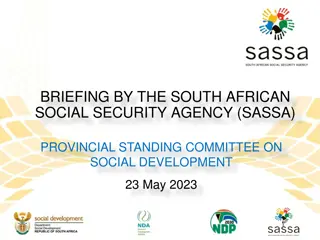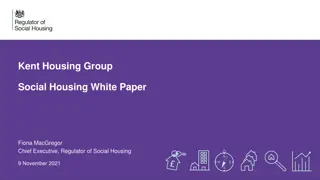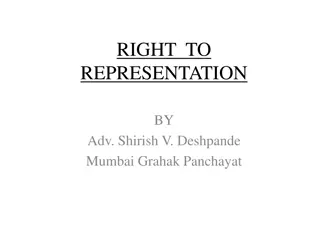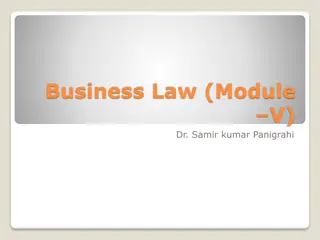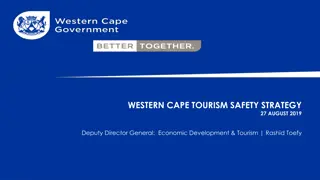Office of the Consumer Protector: Ensuring Business Regulation in Western Cape
The Office of the Consumer Protector (OCP) plays a vital role in safeguarding consumer rights and regulating business practices in the Western Cape province. Established under legislative schemes, including the Western Cape Unfair Business Practices Act and the Consumer Protection Act, the OCP ensures compliance with national norms and standards through its mandate and service offerings. Strategic partnerships with key organizations further enhance its effectiveness in promoting consumer protection and resolving disputes.
Download Presentation

Please find below an Image/Link to download the presentation.
The content on the website is provided AS IS for your information and personal use only. It may not be sold, licensed, or shared on other websites without obtaining consent from the author.If you encounter any issues during the download, it is possible that the publisher has removed the file from their server.
You are allowed to download the files provided on this website for personal or commercial use, subject to the condition that they are used lawfully. All files are the property of their respective owners.
The content on the website is provided AS IS for your information and personal use only. It may not be sold, licensed, or shared on other websites without obtaining consent from the author.
E N D
Presentation Transcript
Department of Economic Development and Tourism Office of the Consumer Protector Programme 4: Business Regulation 22 January 2024
Contents Introduction and Background of the Office of the Consumer Protector (OCP) National and Provincial Legislative Schemes Organogram of the Office of the Consumer Protector OCP Mandate & Service Offering Tribunal Appointment legislative provisions History of Tribunal Next steps in the process Conclusion
Introduction and Background of the Office of the Consumer Protector (OCP) The right to consumer protection is inherent in the Constitution; and a fundamental component to enabling the expression of citizen s socio-economic rights. Consumer Protection is a functional area listed in Schedule 4 of the Constitution, regulating concurrent legislative competence between national and provincial government. There are, currently, two main general statutes which regulate consumer protection in the Western Cape province, namely the Western Cape Unfair Business Practices Act, 2002 (Act 10 of 2002) and the Consumer Protection Act, 2008 (Act 68 of 2008). It is important to note that the Office of the Consumer Protector (OCP) has a mandate to perform powers and functions which are in line with the two main pieces of legislation.
National and Provincial Legislative Schemes The Western Cape Unfair Business Practices Act 10 of 2002 The Consumer Protection Act 68 of 2008 Establishes the Office of the Consumer Protector; National Regulatory Framework; Establishes national norms and standards; Acknowledges role of provinces as ADR agents; Acknowledges role of provincial Tribunals. Prescribes Alternative Dispute Resolution Process; Establishes the Consumer Tribunal.
Strategic Partners National Consumer Commission (NCC); National Credit Regulator (NCR); Financial Sector Conduct Authority; National Energy Regulator of South Africa (NERSA); Council For Medical Schemes (CMS); Independent Communications Authority of South Africa (ICASA); National Regulator for Compulsory Specifications (NRCS); NGO s, NPO s, community structures; Business/industry
Western Cape Consumer Affairs Act, 2002 (Act 10 of 2002) What is the purpose of the WCCAA? What is the purpose of the WCCAA? Provide consumer education & community outreach programmes Investigation of unfair business practices Provide ADR services & Adjudication services
History of Tribunal The Western Cape Consumer Affairs Tribunal was first operationalized in 2012; The Tribunal operated between 2012 and 2015; The department concluded all of the legislative steps and appointed a total of 4 Tribunal members and 2 additional members; The appointed members are noted below: Chairperson: Adv Robbie Vincent Mr Theo Burrows (alternate member) Adv Mandla Mdludlu (member) Mr Selby Tindleni (alternate member) Ms Jackie Lange (member) Mr Herman Wessels (member)
History of Tribunal continued. The Tribunal ceased operations in 2016 due to other strategic imperatives identified by the erstwhile Head of Department; The internal staff resource for the Tribunal was re-assigned to another Programme within the department; The resultant impact was that all unresolved disputes were channeled to the National Consumer Commission for possible prosecution at the National Consumer Tribunal; The motivation for the re-establishment of the Tribunal was eventually approved in late December 2021; This approval led to the initiation of the legislative steps to appoint a new Tribunal in the 2022/2023 financial year; The selection process could however not be concluded successfully in the 2022/2023 financial year as the probity process revealed that a number of nominated candidates were deemed unsuitable. The process was therefore re-started in the 2023/2024 financial year.
What are the benefits of the Tribunal? The Tribunal will provide finality of a dispute by way of an adjudication service to parties involved in a consumer dispute; The service is free of charge and provides effective and efficient resolution of a disputed matter; Civil litigation via the traditional courts are costly and cumbersome most ordinary citizens cannot afford such services very limited free legal services for civil matters; Businesses (especially smme s) involved in consumer disputes often utilize limited resources on customer disputes this affects growth, profitably and also reputation negatively; The Tribunal will now be a channel through which identified disputes can be adjudicated and concluded; Provides a benefit to both citizens and business.
Section 14: Establishment of Consumer Affairs Tribunal 14. (1) The responsible Minister must establish one or more Consumer Affairs Tribunals for the Province by notice in the Provincial Gazette. (2) A tribunal must be established for the area defined in that notice. (3) The responsible Minister may, in like manner (a) vary such an area, and (b) withdraw such a notice and abolish such a tribunal. (4) The seat or seats of a tribunal must be at such place or places as the responsible Minister may from time to time determine in general or in relation to particular proceedings.
Section 15: Appointment of tribunal members 15. (1) Members of a tribunal must be appointed by the responsible Minister in concurrence with the committee. (2) A tribunal must consist of four persons, namely (a) a chairperson, who must be (i) a retired judge of the High Court, or (ii) an attorney, advocate, retired magistrate or a lecturer in law at a university with not less than ten years cumulative experience in one or more such capacities, and (b) three additional members having special knowledge or experience of consumer advocacy, economics, industry or commerce. (3) The responsible Minister may appoint an alternate member for every member of a tribunal. (4) The responsible Minister must, by notice in the Provincial Gazette and an advertisement in the printed media regarded as appropriate by the responsible Minister, invite interested parties to nominate candidates, within 21 days of the publication of the notice and the advertisement, for consideration as members of a tribunal.
Section 15 continued. (5) The names of the nominees must thereafter be published in the Provincial Gazette and the said printed media for comment. (6) Interviews with nominees are open to the public. (7) Interviews must be conducted by the responsible Minister, or by an official of the Department duly appointed for this purpose by the responsible Minister, and such members of the committee as the chairperson of the committee, in concurrence with the responsible Minister, may appoint for this purpose. (8) A member and an alternate member of a tribunal must, before assuming office, make or subscribe an oath or a solemn affirmation in the prescribed form before the responsible Minister. (9) A member and an alternate member of a tribunal must be appointed for the period and be paid the remuneration and allowances determined by the responsible Minister, and the remuneration and allowances may vary for different members and alternate members, as determined.
Section 16: Persons disqualified from being members of tribunals 16. (1) A person may not be appointed or remain a member of a tribunal if he or she is not a fit and proper person or (a) is not a citizen of the Republic of South Africa residing in the Province; (b) is a public servant; (c) at the time is, or during the preceding twelve months was, an office bearer or employee of any party, movement, organisation or body of a party political nature; (d) is an unrehabilitated insolvent; (e) has at any time been convicted, whether in the Republic or elsewhere, of theft, fraud, forgery or uttering a forged document, perjury, an offence under this Act or the Corruption Act, 1992 (Act 94 of 1992), or any offence involving dishonesty; (f) has at any time been removed from an office of trust on account of misconduct, or (g) is absent from two or more consecutive meetings of a tribunal without leave of the chairperson. (2) A person may not remain a member of a tribunal if he or she fails to disclose an interest which would require him or her to be recused, unless the responsible Minister, in concurrence with the committee, decides otherwise.
Section 17: Constitution of tribunal 17. (1) Subject to subsection (4), the quorum of a tribunal court consists of three members. (2) Except where otherwise provided, a decision of the majority of members of a tribunal present is the decision of the tribunal. (3) A member of a tribunal must recuse himself or herself from proceedings on the grounds of an interest or association likely to affect his or her impartiality with regard to the matter under discussion, or which is likely to be seen to do so. (4) If at any stage during the proceedings before a tribunal (a) the chairperson becomes incapable of acting or is absent, the proceedings must begin afresh; (b) any other member sitting in the proceedings becomes incapable of acting or is absent, the proceedings must continue before the remaining members, and (c) two or more members become incapable of acting or are absent, the proceedings must begin afresh unless all the parties to the proceedings agree unconditionally in writing to accept the decision of the majority of the remaining members. (5) If the proceedings continue before an even number of members and there is a split decision, the chairperson s decision is decisive.
Powers, functions and duties of tribunal 18. (1) A tribunal (a) must hear, consider and make a decision on any matter which is before it by virtue of proceedings envisaged by this Act; (b) may award costs, on a scale to be prescribed or in an amount determined by the tribunal, against any person found to have conducted the unfair business practice concerned and to have acted in a fraudulent or grossly unreasonable manner; (c) may generally deal with all matters necessary or incidental to the performance of its functions under this Act, and (d) must exercise any other powers and perform the functions and duties assigned to it under this Act. (2) Process of a tribunal runs throughout the Province and orders of a tribunal have force throughout the Province. (3) The responsible Minister must, subject to the laws governing the Public Service, appoint (a) a secretary for every tribunal to perform the administrative work incidental to the functions of the tribunal, and (b) any other persons that are necessary to assist the secretary of a tribunal.
Process followed for obtaining public nominations 16 newspapers utilized for adverts including the provincial gazette Nomination call placed in all 3 languages General newspaper notice published during July 2023 Gazette notice published during July 2023 Citizens allowed extra time for submission of comment 21 day submission period was provided for
Spreadsheet of Adverts Placed in terms of section 15(4) Cape Times Cape Argus Southern Mail Die Burger Swartland Joernaal Witzenberg Herald Plainsman Mossel Bay Adverteer Vukani Paarl Post Knysna Plet Herald George Herald Athlone News Oudtshoorn Courant Worcester Standard The Provincial Gazette
Results of the public call for nominations A total of 22 nominations were received from members of the public for nominees from all categories; Chairperson nominations (legal expertise) No. 1 Name Bassuday, Claude Ashwin Expertise Admitted attorney, Director Legal Services 2 Broekmann, Stephen Charles Practicing attorney, former legal counsel 3 Cloete, Neville (Dr) Practising attorney (specialising in labour law), Admitted Advocate 4 5 6 7 8 9 10 11 Delport, Kay Rosina Esterhuizen, Lionel CP Morara, Sibongile Naude, Tjakie (Prof) Du Plessis, Andre H Padayachee, Denise Venter, Lizanne De Waal, Reinet Practicing attorney Advocate of the High Court, Advocate of the High Court Professor: University of Cape Town Legal Professional Attorney Attorney Admitted Advocate
Results of the call for nominations Other members (non legal expertise) No. Name Expertise 1 Cain, Charley F Human Human resource manager & developer, former Body Corporate Trustee, Human Capital manager, Diploma in Motor Mechanics. 2 Crouth, Georgina-Marie Consumer Journalist (e.tv), Editor, Reporter & Researcher 3 Fani, Chuma Community developer, Corporate governance & public Affairs, Former member: WC RHT, Western Cape Liquor Tribunal & Western Cape Gambling Board, parliamentary monitoring group & Western Cape Cultural Commission. 4 Ismail, Faeez Retail background (Kismet Spices), Consumer advocate 5 Jansen, Wade Grant Education Sector background, Communications strategist, Sports enthusiast
Other members cont. 6 Louwrens, Elsie Household Aid-Department of Health, Former- PSA labour representative 7 Mdebuka, Ben Non-executive Director: Eastern Cape Liquor board, Former- CEO at FNB (EC), Former deputy General Manager-Southern Life, Alternate Western Cape Liquor Authority member 8 Ntloko, Lizo Director: SA Savings Institute, Saldanha IDZ licensing Company, Capital Harvest Emerging Farmers Fund. 9 Peter, Alvin Lloyd Standard Bank Group Executive head, Chief Operating Officer, Executive, Business Manager. ABSA Group Head: Risk Strategy and Advisory Deloitte: Special Services Group. Accenture: Financial Services, Senior consultant 10 Sesi, Sivuyile Sviggy e-Communication Entrepreneur, Former Tele- marketing agent, Former- Independent Electoral Commissioner, Former-Sales Representative at Sanlam 11 Schroeder, Julian Isaac Community Developer & Activist, Former Para- legal, Library Assistant
Call for comment from the public on nominees The advert calling on public commentary regarding nominated candidates was published during September 2023 in the following publications noted below. The department received 0 responses from members of the public. Cape Times Cape Argus Die Burger Provincial Gazette
Nominees that have withdrawn from the process The following nominees have provided a written indication that they have withdrawn their nominations: 1. Dr. Neville Cloete 2. Ms. Kay Rosina Delport 3. Mr. Chuma Fani 4. Mr. Faeez Ismail 5. Mr. Grant Jansen The following nominees have indicated that they are unavailable on the 2 scheduled days of the interviews: 1. Mr. Ben Mdebuka 2. Mr. Claude Bassuday
Remaining Nominees: Legal Expertise In light of the withdrawals and unavailability of nominees the following persons are available to be interviewed: No. 1 Name Broekmann, Stephen Charles Expertise Practicing attorney, former legal counsel 2 3 4 Esterhuizen, Lionel CP Morara, Sibongile Naude, Tjakie (Prof) Advocate of the High Court, Advocate of the High Court Professor: University of Cape Town 5 6 7 8 Du Plessis, Andre H Padayachee, Denise Venter, Lizanne De Waal, Reinet Legal Professional Attorney Attorney Admitted Advocate
Remaining Nominees: Ordinary member nominees No. Name Expertise 1 Cain, Charley F Human Human resource manager & developer, former Body Corporate Trustee, Human Capital manager, Diploma in Motor Mechanics. 2 Crouth, Georgina-Marie Consumer Journalist (e.tv), Editor, Reporter & Researcher 3 Louwrens, Elsie Household Aid-Department of Health, Former-PSA labour representative 4 Ntloko, Lizo Director: SA Savings Institute, Saldanha IDZ licensing Company, Capital Harvest Emerging Farmers Fund. 5 Peter, Alvin Lloyd Standard Bank Group Executive head, Chief Operating Officer, Executive, Business Manager. ABSA Group Head: Risk Strategy and Advisory Deloitte: Special Services Group. Accenture: Financial Services, Senior consultant 6 Sesi, Sivuyile Sviggy e-Communication Entrepreneur, Former Tele-marketing agent, Former- Independent Electoral Commissioner, Former-Sales Representative at Sanlam 7 Schroeder, Julian Isaac Community Developer & Activist, Former Para-legal, Library Assistant
Next steps in the legislative process Section 15(1) of the Act prescribes that the interview panel for Tribunal nominees must be decided upon by the Minister in concurrence with the chairperson of the Standing Committee; Section 15(7) furthermore empowers the Minister to delegate her role on the interview panel to an official within the department; The Minister has in terms of section 15)7) delegated her responsibility in this regard to the Director within the Office of the Consumer Protector. The remaining and final step is therefore the interview and subsequent selection of the Tribunal members and the submission of a recommendation to the Minister.
Thank you TMS Chase
